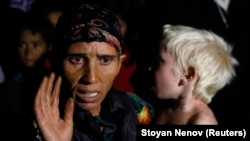WASHINGTON, D.C. —
For more than a week now much of the global media has been fixated on “baby Maria,” a young blond girl who authorities seized from a Romani couple near Farsala in central Greece on the basis of her fair complexion. The couple was arrested and charged with welfare fraud and child abduction.
DNA tests have proved that a Bulgarian Roma woman is the biological mother of the little girl in Greece the press dubbed as “the blond angel.” The woman, Sasha Ruseva, says she gave birth to the baby while working in Greece four years ago and left her in the care of her Roma employers because she could not afford to keep her.
Maria has been placed into the care of Smile of the Child, a children’s advocacy group with ties to several international centers for missing and exploited children. No decision has been made about where she will eventually live.
Christos Failadis, press counselor at the Embassy of Greece in Washington, D.C., says he is pleased that the mystery of “Maria” has been solved. “It is a great moment for Greek police, investigators and prosecutors.”
“Media have been mobilized by the Smile of the Child because Maria could have been a victim of child trafficking,” he said.
While the media has provided non-stop coverage of the case, much of it has tapped into negative stereotypes that have dogged the Roma for centuries—i.e., “Gypsies” as “thieves” and “child snatchers.”
Sinan Gökçen, Media and Communications Officer for the European Roma Rights Centre (ERRC) says If a crime has been committed in Greece, “those who committed it should be treated as individuals, not as representatives of their ethnicity. Such a case could arise in any racial, ethnic, religious or national group.”
He says that Roma communities have already begun to feel backlash from irresponsible reporting. Just this week, a group of “skinheads” in Novi Sad, Serbia, attempted to take a child away from his Roma parents because he was not “dark enough.”
Roma culture knows no borders
So how is it that a baby born to a Bulgarian-Romani mother ended up in the care of a Romani couple in Greece?
Those familiar with Roma culture say it has to do with Romani notions of kinship—it would be far better to place the child among other Roma than non-Roma.
“Extended family is a very fluid notion,” says Dr. Ethel Brooks, Associate Professor in the Departments of Women's and Gender Studies and Sociology at Rutgers University. Of Romani heritage herself, she is also an expert in Roma rights.
She uses the anthropological term ‘fictive’ to describe family relationships--not just among the Roma, but across many other cultures.
“It’s not necessarily a DNA tie, it’s not a blood tie,” Brooks said, “It’s this idea that you have a larger community of people who you think of as your cousins or your aunts or your uncles or grandparents.”
But according to Brooks, there’s more to it than just kinship.
Victims of history
“The history of Romani children in the nation state is not a nice one,” she says, citing the mystery of Aghia Varvara. Between 1998 and 2002, more than 500 Albanian Roma children went missing from this state-run children’s institute where Roma street children were routinely housed. Only four have been located. The fate of the others is unknown.
“We need to find out what happened to them,” Brooks said. “And then there’s the larger historical context of Romani children being taken from their families and either placed in institutions that aren’t caring for them or in non-Roma families.”
According to Brooks, for many Roma the Holocaust — in which hundreds of thousands of Roma were exterminated — is a living memory, even if there are few survivors left.
And recent events such as France’s expulsion of a Roma schoolgirl and her family earlier this month, Sweden’s recent illegal attempts to include all Romani over the age of two in a national database and Italy’s plan five years ago to conduct mass fingerprinting of all Roma children. says Brooks. mean that it’s not hard to see why the baby “Maria” was left with her Romani employers rather than the Greek state.
“This woman, who had come from Bulgaria to Greece to pick olives to provide for her family, has a baby and then has to think, ‘What do I do now, with another mouth to feed?’ It makes perfect sense that she would find somebody in the community to take care of the baby,” said Brooks.
DNA tests have proved that a Bulgarian Roma woman is the biological mother of the little girl in Greece the press dubbed as “the blond angel.” The woman, Sasha Ruseva, says she gave birth to the baby while working in Greece four years ago and left her in the care of her Roma employers because she could not afford to keep her.
Maria has been placed into the care of Smile of the Child, a children’s advocacy group with ties to several international centers for missing and exploited children. No decision has been made about where she will eventually live.
Christos Failadis, press counselor at the Embassy of Greece in Washington, D.C., says he is pleased that the mystery of “Maria” has been solved. “It is a great moment for Greek police, investigators and prosecutors.”
“Media have been mobilized by the Smile of the Child because Maria could have been a victim of child trafficking,” he said.
While the media has provided non-stop coverage of the case, much of it has tapped into negative stereotypes that have dogged the Roma for centuries—i.e., “Gypsies” as “thieves” and “child snatchers.”
Sinan Gökçen, Media and Communications Officer for the European Roma Rights Centre (ERRC) says If a crime has been committed in Greece, “those who committed it should be treated as individuals, not as representatives of their ethnicity. Such a case could arise in any racial, ethnic, religious or national group.”
He says that Roma communities have already begun to feel backlash from irresponsible reporting. Just this week, a group of “skinheads” in Novi Sad, Serbia, attempted to take a child away from his Roma parents because he was not “dark enough.”
Roma culture knows no borders
So how is it that a baby born to a Bulgarian-Romani mother ended up in the care of a Romani couple in Greece?
Those familiar with Roma culture say it has to do with Romani notions of kinship—it would be far better to place the child among other Roma than non-Roma.
“Extended family is a very fluid notion,” says Dr. Ethel Brooks, Associate Professor in the Departments of Women's and Gender Studies and Sociology at Rutgers University. Of Romani heritage herself, she is also an expert in Roma rights.
She uses the anthropological term ‘fictive’ to describe family relationships--not just among the Roma, but across many other cultures.
“It’s not necessarily a DNA tie, it’s not a blood tie,” Brooks said, “It’s this idea that you have a larger community of people who you think of as your cousins or your aunts or your uncles or grandparents.”
But according to Brooks, there’s more to it than just kinship.
Victims of history
“The history of Romani children in the nation state is not a nice one,” she says, citing the mystery of Aghia Varvara. Between 1998 and 2002, more than 500 Albanian Roma children went missing from this state-run children’s institute where Roma street children were routinely housed. Only four have been located. The fate of the others is unknown.
“We need to find out what happened to them,” Brooks said. “And then there’s the larger historical context of Romani children being taken from their families and either placed in institutions that aren’t caring for them or in non-Roma families.”
According to Brooks, for many Roma the Holocaust — in which hundreds of thousands of Roma were exterminated — is a living memory, even if there are few survivors left.
And recent events such as France’s expulsion of a Roma schoolgirl and her family earlier this month, Sweden’s recent illegal attempts to include all Romani over the age of two in a national database and Italy’s plan five years ago to conduct mass fingerprinting of all Roma children. says Brooks. mean that it’s not hard to see why the baby “Maria” was left with her Romani employers rather than the Greek state.
“This woman, who had come from Bulgaria to Greece to pick olives to provide for her family, has a baby and then has to think, ‘What do I do now, with another mouth to feed?’ It makes perfect sense that she would find somebody in the community to take care of the baby,” said Brooks.










